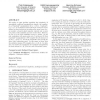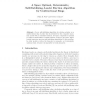85 search results - page 7 / 17 » The Complexity of Bribery in Elections |
ATAL
2010
Springer
13 years 8 months ago
2010
Springer
We resolve an open problem regarding the complexity of unweighted coalitional manipulation, namely, the complexity of Copeland -manipulation for {0, 1}. Copeland , 0 1, is an...
EUROCRYPT
1997
Springer
13 years 11 months ago
1997
Springer
In this paper we present a new multi-authority secret-ballot election scheme that guarantees privacy, universal verifiability, and robustness. It is the first scheme for which the ...
SSS
2010
Springer
13 years 6 months ago
2010
Springer
In this paper we present new distributed protocols to color even rings and general bipartite graphs. Our motivation is to provide algorithmic explanation for human subject experime...
WDAG
2001
Springer
2001
Springer
A Space Optimal, Deterministic, Self-Stabilizing, Leader Election Algorithm for Unidirectional Rings
14 years 3 days ago
A new, self-stabilizing algorithm for electing a leader on a unidirectional ring of prime size is presented for the composite atomicity model with a centralized daemon. Its space c...
CORR
2012
Springer
12 years 3 months ago
2012
Springer
All previous work on “candidate-control” manipulation of elections has been in the model of full-information, simultaneous voting. This is a problem, since in quite a few real...


